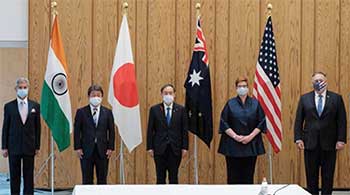Fall Armyworm
Why in NEWS ?
- In the villages of T. Kallupatti and Sedapatti in Madurai district, farmers have reported spotting fall armyworm, an invasive pest, in maize fields.

About
- Officials from the Agricultural Department, who recently inspected the maize fields however, say that the infestation of the pest is at the beginning stage, and can be brought under control by following safety precautions.
- Maize is cultivated in around 11,000 hectares in the district, with the majority of the area falling within rain-fed blocks, as it is not a water-intensive crop.
Concern
- Maize farmers are worried about possible crop damage that could be caused by the fall armyworm.
- The farmers faced heavy financial losses in the previous years due to fall armyworm attacks. Many farmers have still not received the insurance for the crops that were damaged in previous years.
- Many farmers are able to find out about the attack only after the attack becomes severe. The proliferation of the pest is also fast.
Fall Armyworm
- Its scientific name is Spodoptera frugiperda and also commonly referred as Fall Armyworm (FAW).
- It is a dangerous transboundary insect with a high potential to spread rapidly due to its natural distribution capacity and opportunities presented by international trade.
- FAW represents a real threat to food security and livelihoods of millions of smallholder farmers by spreading across all of sub-Saharan Africa, the Near East and Asia.
Control and Elimination
- Farmers need significant support to manage FAW sustainably in their cropping systems through Integrated Pest Management (IPM) activities.
- FAW cannot be eliminated.
- The Food and Agriculture Organisation (FAO) has launched a Global Action for FAW Control as a response to the international threat posed by the armyworms.
Quad Meet
Context
- In a rare “in-person” meeting during the pandemic, the Foreign Ministers of the Quadrilateral grouping — US, India, Japan and Australia — met in Tokyo on October 06,2020

About
- This is the second meeting of the Quad, formed in 2017 to cooperate on economic and regional security issues -- which are topped by China's growing belligerence in the region. The grouping has been denounced by China as one that hampers its growth.
- For years, China has been involved in territorial disputes in the resource-rich South and East China Seas – an area said to have abundant reserves of minerals, oil and other natural resources.
- Foreign minister S Jaishankar underscored India's commitment to "rules-based international order, territorial integrity, sovereignty and peaceful resolution of disputes" at the meeting of Quad -- four major Indo-Pacific democracies of India, the US, Japan and Australia.
- In the backdrop of the border dispute with China and the southeast Asian giant's aggressive military behaviour in the Indo-Pacific and the South China Sea, the four nations re-affirmed the importance of maintaining a free, open and inclusive Indo- Pacific.
India’s Stand
- India, the minister said, remains committed to "upholding the rules-based international order, underpinned by the rule of law, transparency, freedom of navigation in the international seas, respect for territorial integrity and sovereignty and peaceful resolution of disputes".
- "Our objective remains advancing the security and the economic interests of all countries having legitimate and vital interests in the region," Mr Jaishankar said at the meeting in Tokyo.
Agreement between QUADs
- The four nations agreed to step up coordination in creating a free and open Indo-Pacific. The meet, hosted by Japanese Prime Minister Yoshihide Suga, was also attended by US Secretary of State Mike Pompeo and Australian Foreign Minister Marise Payne.
- Mr Pompeo took a hard line on China, asking the Asian allies to unite against Beijing's "exploitation, corruption and coercion" in the region.
- It is "more critical now than ever that we collaborate to protect our people and partners from the CCP's (Chinese Communist Party) exploitation, corruption and coercion"







